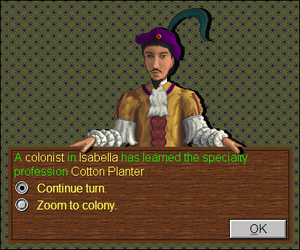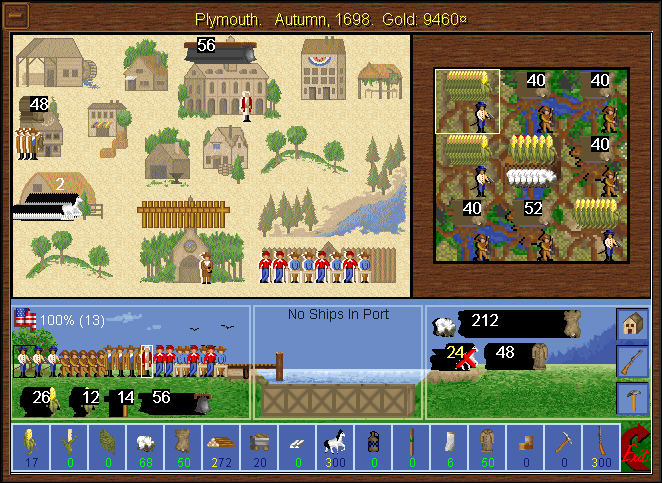This page is based on a section of User blog: Robin Patterson/Col1 FAQ by Toby Douglass. Comments on it should be on its talk page rather than on the blog.
Material copied from http://45mercystreet.com/computing/col94/index.html with specific (e-mail) permission of author (Toby Douglass)
Disbanding a Stockaded Colony
Some version(s?) of Colonization have a bug which permits a stockaded colony to be disbanded.
Empty the colony so that there remain only three colonists and 50 muskets. Starve the colony so one colonist dies (a quick way to do this is to build a wagon train and move all the food into the train). Then, make one of the two remaining colonists a soldier or a dragoon (but not a pioneer; that doesn't work). You will then find you can move the final colonist out of the colony and the "do you wish to disband this colony?" question will be presented. Answering yes then disbands the colony.
Note this solution does not work if Sieur De La Salle (stockades on all colonies size three or greater) is in Congress.
Prime Tiles
Prime Tiles are, unexpectedly, not always the most productive tile of their type. Some prime tiles double production - and they always are the best - but some only add a fixed number of units of production and these prime tiles can in fact be equalled or even beaten by tiles which hold major rivers or game (although a prime tile with a major river is of course best of all).
So, for example, a prime fur tile with a road, worked by an expert in a colony with no Sons of Liberty production bonuses, without Henry Hudson (no double fur production), produces 16 furs per turn.
A normal mixed forest tile with a major river and a road, worked by an expert in a colony with no Sons of Liberty production, without Henry Hudson (no double fur production) produces 18 furs per turn.
The key factor is the presence of a Major River. These count as two Minor Rivers, and a Minor River is equal to a Road.
Conversely, Prime Tobacco gives a 2x multiplier (rather than +3 like Fur). A plowed Prime Tobacco tile worked by an expert produces 16 tobacco per turn. A plowed grassland tile with a major river worked by an expert produces only 12 tobacco.
Tobacco, Cotton and Sugar are 2x prime tiles and are always best
Fur is a +3 prime tile and can be beaten.
Ore is a +3 prime tiles and so I believe can be beaten but I have not verified this.
Finally, note that if a minerals deposit exists on a rain-forest tile and that square is cleared, the mineral deposit is lost. Note however when a rain-forest tile is cleared, a mineral deposit can be revealed. I have seen it happen that clearing a rain-forest tile reveals a tile below which itself also has a mineral deposit.
Learning From Experience

Colonists working a tile can spontaneously learn the expert skill for that tile. This seems to only happen on prime tiles. I have only seen it happen for furs, cotton and tobacco. Having a road in the tile seems to help. Prisoners, servants and normals can learn; I don't know if skilled colonists can convert.
For a long time, I thought this functionality was bugged, because it just never seemed to happen, or only worked for fur trappers.
Boycotts
When a tax hike is presented, the good chosen which can be boycotted is generally either a good in a ship which is just about to arrive in Europe or the most valuable cargo you have in a colony at the time.
The most important good not to have boycotted early in the game is Tools. You can't yet make them, and you need to them to get to the point where you can make them. The way to avoid a Tool boycott is never to have any tools stored in a colony. You never sell Tools to Europe early in the game, so they're never chosen by that route, and if you have no Tools stockpiled, they can never be a most valuable stockpiled cargo.
If necessary, store Tools in a wagon train.
Offers From Europe
When certain situations arise, the home country will offer you certain services.
If you move a treasure chest into a colony and you have no galleon, the home country will offer to transport the treasure. You will be charged a percentage of the value of the treasure as a fee. On the hardest level the fee is 70%. I believe this goes down by 5% per difficulty level.
If you have no military shipping and a pirate attacks one of your ships, the home country will offer you a frigate. Accepting causes a large rise in the tax rate - 7 or 8 percent - which can be useful if you're working towards an effective and early Thomas Paine.
Finally, when you have a fair amount of gold in the bank, European countries may offer you military forces (Dragoons and cannon) for gold. They invariable ask sky-high prices and I've never felt the need to accept.
Miscellaneous
Every time you buy cannon from your home country, the price rises by 100 gold. Note however if when buying a cannon at the "are you sure yes/no?" question you select "no", the price will STILL rise by 100 gold.
When a new Founding Father joins, the liberty bell count is reset to zero; any excess bells generated for the turn where the Father joins are thrown away. So if you need 10 bells to get the next Father, you have 9 and you generate 5 in the next turn, 4 bells are thrown away.
In the Foreign Affairs report, the population scores for foreign powers includes people on the docks in their home countries.
A unit on an automatic GOTO will travel through and reveal Rumours on its path.

